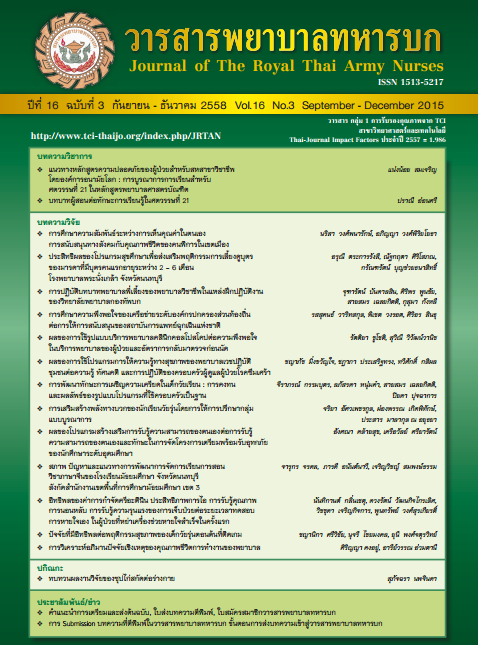การพัฒนาทักษะการเผชิญความเครียดในเด็กวัยเรียน: การคงทน และผลลัพธ์ของรูปแบบโปรแกรมที่ใช้ครอบครัวเป็นฐาน; Promoting Coping Skills in School-age Children: Adherences and Results of Family-based Intervention.
Keywords:
ความสามารถในการปรับฟื้นคืนสภาพจิตใจ, ทักษะการเผชิญความเครียด, โปรแกรมที่ใช้ครอบครัวเป็นฐาน, การอบรมพ่อแม่, Resilience, Coping skill, Family-based intervention, Parents trainingAbstract
การวิจัยกึ่งทดลองนี้ มีวัตถุประสงค์เพื่อศึกษาผลของโปรแกรมพัฒนาความสามารถในการปรับฟื้นคืนสภาพจิตใจร่วมกับโปรแกรมอบรมในพ่อแม่ต่อทักษะการเผชิญความเครียดและการแก้ปัญหา และการคงอยู่ของผลลัพธ์ กลุ่มตัวอย่างเป็นเด็กวัยเรียนอายุระหว่าง 10 - 11 ปี จำนวน 102 คน สุ่มเข้ากลุ่มทดลอง กลุ่มเปรียบเทียบ และกลุ่มควบคุม เก็บรวบรวมข้อมูลก่อนเข้าโปรแกรมหลังสิ้นสุดโปรแกรมทันที และหกเดือนหลังสิ้นสุดโปรแกรม โดยใช้แบบวัดการเผชิญความเครียดเชิงรุก วิเคราะห์ข้อมูลโดย ใช้การวิเคราะห์ความแปรปรวนแบบวัดซ้ำ และสถิติทดสอบค่าที ผลการวิจัยพบว่า เด็กวัยเรียนมีความแตกต่างของค่าเฉลี่ยคะแนน ทักษะการเผชิญความเครียดและการแก้ปัญหาในแต่ละกลุ่มอบรม ตลอดทุกช่วงของการวัดอย่างมีนัยสำคัญทางสถิติ (F = 3.54, p < .05) และมีปฏิสัมพันธ์ระหว่างเวลาและชนิดของกลุ่มอบรมที่ต่างกัน ส่งผลต่อความแตกต่างของค่าเฉลี่ยคะแนนทักษะการเผชิญความเครียดและการแก้ปัญหาอีกด้วย (F = 24.74, p < .05) นอกจากนี้พบว่ากลุ่มอบรมที่ต่างกัน มีค่าเฉลี่ยคะแนนทักษะการเผชิญ ความเครียดและการแก้ปัญหา แตกต่างกันอย่างมีนัยสำคัญทางสถิติ (F = 47.46, p <.05) และกลุ่มทดลองมีค่าเฉลี่ยคะแนนสูงกว่ากลุ่มเปรียบเทียบ และกลุ่มเปรียบเทียบ มีค่าเฉลี่ยคะแนนสูงกว่ากลุ่มควบคุมอย่างมีนัยสำคัญทางสถิติ (Effect Size = 2.24, 0.25 ตามลำดับ) ข้อเสนอแนะ พยาบาลอนามัยโรงเรียนและครูสามารถใช้โปรแกรมพัฒนาความสามารถในการปรับฟื้นคืนสภาพดจิตใจร่วมกับโปรแกรมอบรมในพ่อแม่ ซึ่งเป็นการจัดกระทำที่ใช้ครอบครัวเป็นฐาน (Family-based Intervention) นั้นช่วยให้เด็กวัยเรียนมีทักษะในการเผชิญความเครียดและการแก้ปัญหาได้คงทนอย่างน้อยที่ระยะ 6 เดือน อย่างไรก็ตามควรมีการติดตามผลในระยะที่ยาวนานขึ้น การอบรมกระตุ้นซำ้ต่อเนื่องทุกภาคการศึกษา
This quasi-experimental study aimed at examining the intervention on child coping skills and adherences. Families of 102, 10 - to 11 - year-old children were randomly assigned to experimental (parent plus child resilience training: PT+ CRT); comparative (child resilience training: CRT); and control group.Data were collected before, immediately after, and six months after the program by using the Proactive Coping Inventory. Repeated measures ANOVA were used to investigate outcomes and adherences. Following the 6-month intervention significant effects were found over time between three groups (F = 3.54, p < .05). Additionally, significant interaction was found between type of intervention and coping skills over six-month period (F = 24.74, p < .05). Children showed more coping skills significantly in the PT+ CRT and CRT conditions than in control over time (F = 47.46, p < .05), along with larger to medium effect sizes (Effect Size = 2.24, 0.25, respectively). The findings suggest that school nurse and teacher might use this resilience training program as family-based intervention to promote coping skills adherently in school-age children. However, intervention
needs a longer duration and boosters for improving child outcomes and adherences.
Downloads
Downloads
How to Cite
Issue
Section
License
บทความหรือข้อคิดเห็นใดใดที่ปรากฏในวารสารพยาบาลทหารบกเป็นวรรณกรรมของผู้เขียน ซึ่งบรรณาธิการหรือสมาคมพยาบาลทหารบก ไม่จำเป็นต้องเห็นด้วย
บทความที่ได้รับการตีพิมพ์เป็นลิขสิทธิ์ของวารสารพยาบาลทหารบก
The ideas and opinions expressed in the Journal of The Royal Thai Army Nurses are those of the authors and not necessarily those
of the editor or Royal Thai Army Nurses Association.






